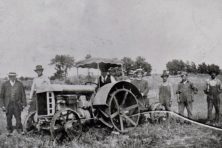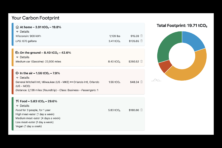Farming-Footprint Data Released
- Share
- Tweet
- Pin
- Share

Three-year, on-farm sustainability progress report includes farms in Door and Kewaunee counties
Results have been released from a multi-farm project in Kewaunee and Door counties that analyzed crop acres over three years to demonstrate the impact conservation practices can have on both natural resources and overall farm productivity.
The project includes members from Peninsula Pride Farms (PPF), a farmer-led conservation group. The group said in a statement that it was encouraged by the study results, most notably in the mitigation of excess loss of subsurface nitrogen on 91% of the fields in the project study.
The progress report also showed areas within the watershed where improved nutrient management practices could be implemented, said dairy farmer Duane Ducat, a project participant and PPF president.
“This project helps provide the data to show us that the increasing use of conservation practices we and other farmers have adopted, can impact the groundwater resources,” Ducat said.
The 19-page report at farmersforsustainablefood.com/projects summarizes three years of data collection and analysis (2020-2022 crop years) involving 11 PPF farmers from Door and Kewaunee counties who collectively manage over 34,000 acres and a combined dairy cattle headcount of over 40,000. The farmers in the study worked to obtain environmental information regarding their farming footprint on greenhouse gas emissions, water quality, soil erosion and energy efficiencies.
Farmers for Sustainable Food and PPF worked together since 2020 to create the baseline set of information from seven core sustainability metrics. Additionally, PPF was interested in how their farmer members were impacting local water resources and worked with FSF and Houston Engineering to identify how current and future in-field best management practices are influencing changes to local water resources.
PPF farmers have been experimenting with a variety of practices on their farm fields to improve the soil and protect surface water and groundwater for several years. The adoption of these conservation practices is a continuous journey for Nick Guilette – a project participant, fourth-generation farmer, and certified crop advisor for his employer, Ebert Enterprises.

Guilette said he’s using the individual farm reports to implement changes and believes the project results help him make more informed crop management decisions.
“An advantage we have is comparing metrics, not only with our peers but also against state and national benchmarks,” Guilette said. “Our individual report helped identify how intense the energy demand of nitrogen is. We are now working to find ways to use nitrogen more efficiently, like planting legume-based cover crops that could provide a nitrogen source to crops like wheat or corn.”
The study effort and data collection were applauded by Steve Richter, The Nature Conservancy’s director of agriculture strategies in Wisconsin, as a critical first step.
“It’s foundational to achieving accurate emissions inventories,” Richter said. “I look forward to the day farmers with such data can secure financial incentives recognizing their efforts to use conservation practices.”
For more information, go to farmersforsustainablefood.com or peninsulapridefarms.org.



